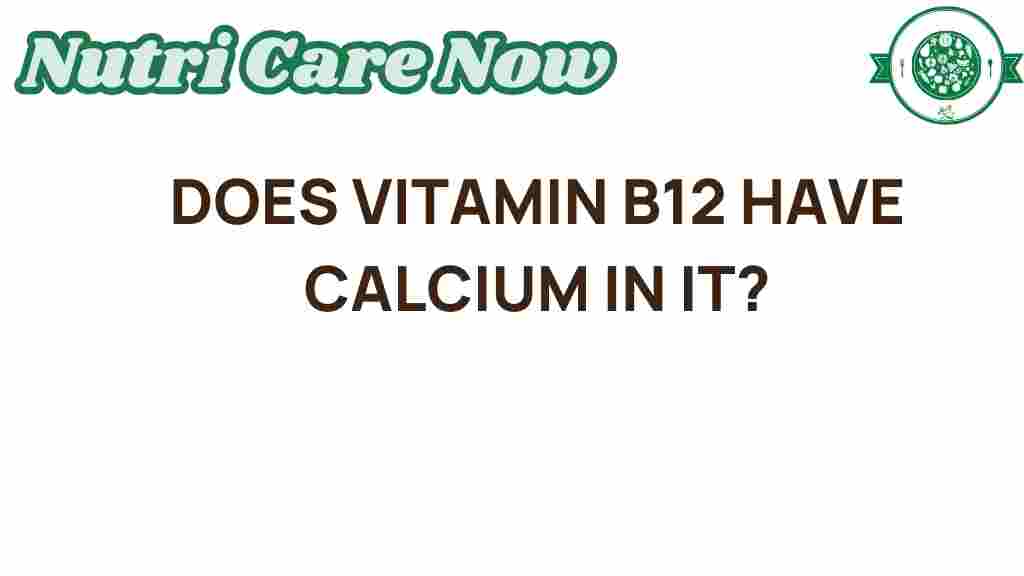Unraveling the Mystery: Does Vitamin B12 Contain Calcium?
In the world of nutrition, the roles of vitamins and minerals are often intertwined, leading to confusion about their specific functions and sources. One common question that arises is whether Vitamin B12 contains calcium. This article aims to dissect this query, exploring the relationship between these two essential nutrients, their health benefits, dietary sources, and the importance of supplementation.
Understanding Vitamin B12 and Calcium
To address the question, “Does Vitamin B12 contain calcium?”, we first need to understand what Vitamin B12 and calcium are, and their significance in our diet.
Vitamin B12, also known as cobalamin, is a water-soluble vitamin that plays a critical role in the production of red blood cells, neurological function, and DNA synthesis. It is primarily found in animal products, making it essential for those following vegetarian or vegan diets to seek alternative sources or supplements.
Calcium, on the other hand, is a vital mineral that is crucial for building and maintaining strong bones and teeth. It also plays a significant role in muscle function, nerve signaling, and blood clotting. The recommended daily intake of calcium varies by age and gender, but it is generally advised to consume adequate amounts through dietary sources or supplements.
The Relationship Between Vitamin B12 and Calcium
Now, let’s directly address the initial query: No, Vitamin B12 does not contain calcium. They are distinct nutrients with different functions and sources. However, they can interact in various ways within the body.
Calcium is essential for the absorption of Vitamin B12 in the gut. A deficiency in calcium may lead to malabsorption of Vitamin B12, even if adequate amounts are consumed. Therefore, while they do not contain one another, maintaining a balance of both vitamins and minerals is essential for optimal health.
Health Benefits of Vitamin B12
Vitamin B12 is a powerhouse nutrient that offers numerous health benefits, including:
- Red Blood Cell Formation: B12 is critical in producing red blood cells, preventing anemia.
- Nervous System Health: It supports neurological function and helps maintain the protective sheath around nerves.
- DNA Synthesis: B12 is vital for DNA production, ensuring proper cell division.
- Energy Production: It plays a role in converting food into energy, helping reduce fatigue.
Health Benefits of Calcium
Calcium is equally important, with its health benefits including:
- Bone Health: Essential for developing and maintaining strong bones.
- Muscle Function: It is required for muscle contractions, including the heart muscle.
- Nerve Transmission: Calcium aids in transmitting signals in the nervous system.
- Blood Clotting: It is a key player in the blood coagulation process.
Dietary Sources of Vitamin B12
For those looking to boost their Vitamin B12 intake through food, consider the following sources:
- Animal Products: Beef, liver, chicken, fish, and eggs.
- Dairy Products: Milk, yogurt, and cheese.
- Fortified Foods: Some cereals and plant-based milk alternatives are fortified with B12.
Dietary Sources of Calcium
To ensure adequate calcium intake, include these foods in your diet:
- Dairy Products: Milk, cheese, and yogurt are excellent calcium sources.
- Leafy Greens: Kale, bok choy, and broccoli provide calcium as well.
- Fortified Foods: Certain juices, plant-based milks, and cereals are fortified with calcium.
- Fish: Sardines and salmon (with bones) are rich in calcium.
Vitamin B12 and Calcium Supplements
If you find it challenging to get enough Vitamin B12 or calcium from your diet, supplements are available:
- Vitamin B12 Supplements: Available in various forms, including tablets, sublinguals, and injections.
- Calcium Supplements: Commonly found as calcium carbonate or calcium citrate. It’s essential to choose the right type based on your body’s needs.
Always consult with a healthcare professional before starting any new supplement regimen, especially if you have underlying health conditions or are pregnant.
Step-by-Step Guide to Ensuring Adequate Intake of Vitamin B12 and Calcium
Here’s a simple guide to help you ensure you’re getting enough Vitamin B12 and calcium:
- Assess Your Diet: Review your current dietary habits to identify sources of Vitamin B12 and calcium.
- Incorporate Foods: Add more food sources of both nutrients into your meals.
- Consider Fortified Options: Look for fortified foods that can boost your intake of Vitamin B12 and calcium.
- Take Supplements if Needed: If dietary sources are insufficient, consider a supplement after consulting with a healthcare provider.
- Regular Testing: If you suspect a deficiency, get tested to check your levels of Vitamin B12 and calcium.
Troubleshooting Tips
If you are experiencing symptoms of deficiency in either nutrient, consider the following troubleshooting tips:
- Identify Symptoms: Symptoms of Vitamin B12 deficiency may include fatigue, weakness, and neurological issues. Calcium deficiency can lead to muscle cramps, brittle nails, and dental issues.
- Evaluate Your Diet: Ensure your diet includes enough protein, dairy, and leafy greens.
- Consult a Professional: Speak with a registered dietitian or healthcare provider for personalized advice.
Conclusion
In summary, while Vitamin B12 does not contain calcium, both nutrients are vital for maintaining good health and should be consumed in adequate amounts. Understanding their distinct roles and ensuring you get them from dietary sources or supplements can significantly enhance your overall well-being. Always prioritize a balanced diet rich in vitamins and minerals to support your health.
For more information on nutrition and dietary sources, check out this detailed guide. Additionally, to learn more about the interaction of various vitamins and minerals, visit this resource.
This article is in the category Health and created by NutriCareNow Team
